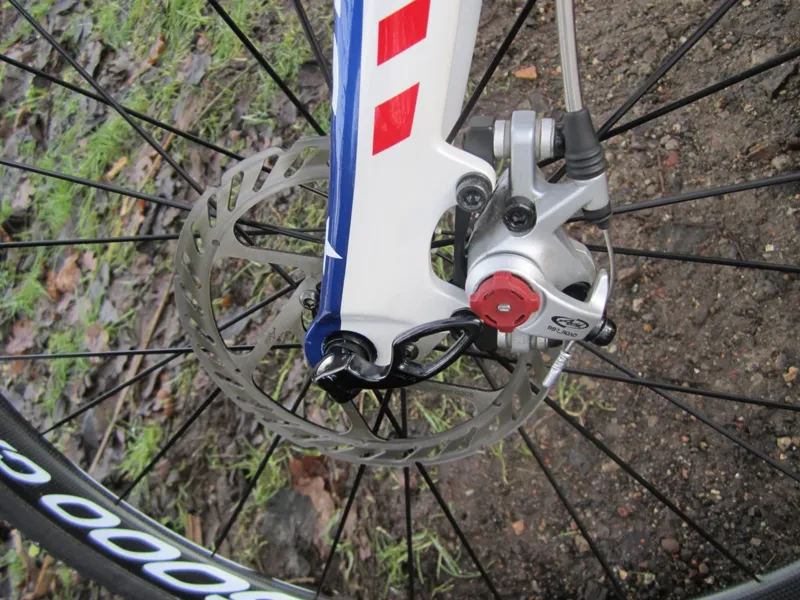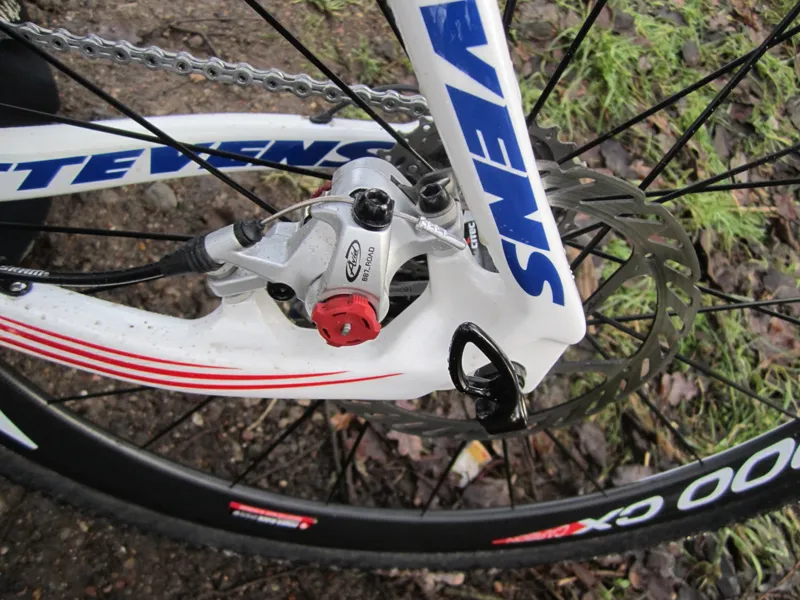The International Cycling Union (UCI) lifted its ban on disc brakes for cyclo-cross bikes last year and while most of the buzz surrounding the decision relates to how the change will affect life in the mud, ultimately it's likely to have a far greater impact on the road bike market. After all, the two genres share nearly all of their DNA and new technologies and problems solved for one can carry over into the other.
We sat down for a chat with Avid product manager Paul Kantor to get his thoughts on these latest developments, plus his take on the current and future state of mountain bike discs. His industry insider crystal ball tells us that we'll definitely see discs on road bikes sooner rather than later. Apparently, the wave is still out at sea but building fast – and it might soon be time to think about getting on top and riding it into shore.
BikeRadar: How would you describe the current state of mountain bike disc brakes? And where do you want them to be – what's your ultimate goal?
Paul Kantor: I have to give Hayes credit – that first brake [the HFX Mag] was really good for 1997. Brakes today are a lot better, in terms of performance, consistency and definitely lever feel. I've spent the last 13 years working on brakes and when I think about how hard it is, that was a really good brake.
Weights are pretty good now and I don't think we need to get much lighter. We've seen a real maturity as the technology has improved. I really like how we've finally stabilized in terms of mounting standards – it’s mostly direct [post mount] now; direct rear is coming on a lot. I still don't think brakes are as consistent as they should be. Roll back, or pad clearance, is something we can all improve on as well.
There's also this weird harmonic vibration issue that goes on with frames and brakes – we have it, our competitors have it – so that's something we need to work on because that detracts from your mountain biking experience. Brakes get blamed 100 percent but it's a shared phenomenon.
And then reliability [has to be worked on]... For most people who buy a bike, they want to ride it on the weekends, they put it away dirty – so I think less frequent maintenance cycles and more robust product over time is really what I'd like to see improved.
Are there things that the high-end market is still specifically asking for?
For me it would fall in the realm of heat management, where they want to run smaller rotors and more compact designs but in more aggressive terrain. There's this emerging lightweight 140-150mm bike – the Scott Geniuses of the world – that to me seems to be the most exciting, enjoyable part of mountain biking right now.
Those guys are asking for cross-country weight product but it needs to be robust. So finding that magic balance between running small rotors, having good power and being able to heat – it's that classic Bontrager argument [Keith Bontrager famously said of bike components: “Light, strong, cheap – pick any two!”].
Have Avid thought about an active, rather than passive, cooling system?
We've done that before where we've physically put waffles in the caliper surface or some ducting in there. [The problem is that we don't have much] air passing over the caliper. The caliper is behind the fork and it'd be a really hard sell to get people to change that around. And a lot of the time we don't maintain those high speeds that would have a good effect there so that becomes challenging.
We've got some ideas on ways to manage that more actively but they're still about heat management and dissipating heat rather than just preventing things from getting hot in the first place. But you want a certain amount of heat anyway because that's where friction materials start to work really well. Everything feels better at a certain temperature, but it's a narrow edge – you reach a certain point and suddenly everything comes apart.
We have a super-challenging environment relative to cars and motorcycles because we're so weight-restricted – you're powering yourself and you don't want to add that weight – and we have such a small area to work in and such a high performance requirement. It's a super-fun place to work relative to motorcycles because their brakes just haven't evolved that much.
With this latest UCI ruling on disc brakes for 'cross bikes, it seems that you're going up against a much more traditionalist culture relative to the mountain bike boom. What's your outlook on that?
The funny thing about the cyclo-cross community is that they're less traditional than the classic road community and more traditional all at the same time. There are certain areas where they seem fully open to trying new things – like with wheels at the moment – and then they'll want to run lightweight cantilever brakes so there's a weird balance there. The UCI ruling is encouraging for sure, and it's something I've pondered for four or five years. It's an idea whose time has finally arrived.
I don't think the long-term benefits for disc brakes on 700c bikes are in cyclo-cross, though. It's hopefully a gateway to the ProTour, and the general consumer, more importantly. It'll resolve a bunch of challenges for us as a disc brake manufacturer. In cyclo-cross I think we can make something that works well and then get the weight down pretty quickly. It'll be a couple of years for that to evolve and I think you'll see the cyclo-cross community take that on once we get the weights down.
I'm super-focused on a sealed system. I think there's a certain price and threshold for mechanicals just because they're a little less expensive to make in some areas but for the elite level, they need a system that's less exposed to the environment. One of the big advantages is taking the brake surface off the rim itself – that's a huge advantage for wheel manufacturers, too.
I think the weights will be super-comparable in a year or two [after 'cross disc brakes are introduced] and there'll be much better braking power from the hoods. So it's a lot of small things that you don't think of initially – it's that collective package of improvements that people are really going to enjoy. When you pose the question to them in the short-term, they don't have the advantage of having ridden one so they're [either] not really comparing it to anything or they're comparing it to a mountain bike.
Have you guys talked to the UCI about what this might lead to? Do you ultimately want disc brake technology to make its way onto the road?
Yeah, without a doubt. It's good for cycling, it's good for the consumer, it's safer. At the ProTour level they have excellent mechanics that hyper-maintain their product but they're all riding tubulars. It takes that whole dynamic about the glue, the heat, the temperature on the braking surface... I know the guys at Zipp have some ideas on how the wheels can be improved by not having to worry about the braking surface. I think the challenge would be those long 45-minute descents in Europe where you get back to heat management.
We haven't had that conversation with the UCI but we'd love to. Brakes on road bikes just haven't improved and we have the opportunity now to really move that forward. It'll be an expensive transition. There are all those wheels, there's all that support system in place that's built around these current hub standards. So there's some stuff to figure out and it'll be challenging, but the benefits are well worth it.
In how many years do you think disc brakes across the board will be the norm rather than the exception?
My hope is four to five years, that it'll move that quickly. We've already been working on stuff and we've talked to OEs [original equipment manufacturers, ie. bike companies]. Companies are putting a lot of brainpower to it already. There's an excitement for it and I think it could be one of those few instances where the public may have the opportunity to buy a more advanced technology than what the ProTour guys are riding instead of the other way around. The consumer could buy a UCI-legal weight limit bike that has a power meter and disc brakes that works better than what Contador or the Schlecks are riding.
So, do you anticipate that road bike disc brakes will be mechanical or hydraulic in nature?
We've always had strong demand for a high-end mountain mechanical, surprisingly. It's not going to set the world on fire but there's definitely a market – there's no question. I think the long-term path to success is everything that's good about a hydraulic – the sealed system and the longevity – and then there's cable routing as well.
If you have a nice straight line for a mechanical, it feels good, but if you don't… hydraulics really aren't affected that much. We don't have full-suspension road bikes and complex suspension designs to work around, but if you look at how they're pushing to integrate cables inside the frame, there might be some weird bends in there and hydraulics would accommodate that better for sure.

Get used to seeing stuff like this on road bikes (albeit hydraulic rather than cable-operated) if Avid's Paul Kantor is correct

